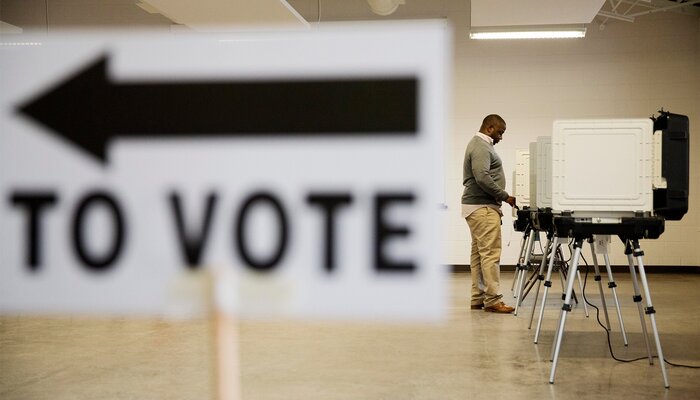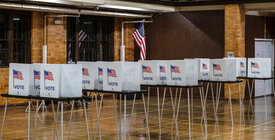
The Many Problems with the GOP-Backed Voting Bill
The legislation would impose harmful election rules nationwide, and it targets DC for the worst of them.

Part of
This week, House Republicans reintroduced a bill dubbed the American Confidence in Elections (ACE) Act. It was first introduced in 2022 as a purported alternative to the landmark, pro-voter Freedom to Vote: John R. Lewis Act, which came very close to becoming law last Congress.
The ACE Act underscores the fact that Congress has a crucial role to play in safeguarding fair and secure elections. Indeed, Congress needs to enact baseline national standards to protect the freedom to vote in the face of ongoing threats — including efforts to make voting harder, manipulate election outcomes, and infiltrate vulnerable election infrastructure.
Unfortunately, the bill that was just introduced does not address these challenges. Instead, as the Brennan Center’s Wendy Weiser recently testified, the bill would further erode voting access and take other steps to undercut impartial election administration, especially in the District of Columbia. This is especially concerning on the heels of the 10 year anniversary of Shelby County v. Holder and in light of the record-breaking numbers of state restrictive voting and election interference laws enacted that are eroding voting rights and access on a national scale. The bill would also open the door even wider for undisclosed big money spending in federal elections and make other harmful campaign finance changes.
Here are four problems with the House majority’s election bill:
The ACE Act would impose unnecessary restrictions on voting rights and election administration nationwide.
The bill would impose several new national rules for federal elections that would erect barriers similar to voting restrictions enacted by a number of state legislatures over the past few years. These new rules, typically rooted in misinformation, would make voting harder and undermine election administration, often in ways disproportionately impacting voters of color.
The bill would institute a de facto nationwide ban on most third-party ballot assistance (sometimes pejoratively called “ballot harvesting”) by restricting federal funding — on which all states depend to help run their elections — for any state that permits it. Ballot assistance is a process by which a third party — often a political party or grassroots organization — collects and returns a voter’s completed mail ballot. It is a legitimate practice that has long been critical to helping many different groups, including Native American, rural, elderly, and low-income voters, access the vote. Both major political parties make use of this method where it is permitted. Opponents have tried to link ballot assistance to voter coercion and ballot tampering, which are already illegal, but there is no evidence that it actually exacerbates the risk of these crimes.
The bill would also mandate that voters requesting mail ballots by mail or online include a copy of their identification with that application. This requirement is another unnecessary barrier. Mail voter fraud rates are infinitesimally small, and extensive research shows that mail voting is secure. Many voters who most need access to mail voting — including voters with disabilities, low-income voters, or others who simply do not work in an office — lack easy access to a photocopier. This requirement would likely disproportionately impact people of color: for instance, after Texas imposed similar barriers to mail voting, voters of color were at least 30 percent more likely to have an application or mail ballot rejected than white voters.
Moreover, the ACE Act would prohibit 501(c)(3) nonprofit organizations from providing any funding for a state or local government’s election activities. Although elections are a quintessential government function, election officials rely on grants from such organizations for additional support. This support was especially important ahead of the 2020 election, during which cash-strapped officials faced the daunting task of conducting a national election at the height of the Covid-19 pandemic. The roughly $400 million in additional funds Congress appropriated was helpful but not enough to sufficiently fund necessary changes, requiring civil society to step in. The best solution is for Congress to provide an adequate and consistent stream of funding to support election administration, not prohibiting alternative sources.
Finally, the bill includes new and concerning language, such as provisions that would increase the risk of political interference in the census and undermine the president’s recent executive order instructing the federal government to take steps to expand voting access.
The ACE Act targets DC’s election code for a wholesale takeover.
The bill would drastically overhaul Washington, DC’s existing election procedures, restricting the freedom to vote for the district’s 700,000 residents in numerous ways. For instance, it would impose burdensome new restrictions on the city’s mail voting systems, including a new requirement that all ballot drop boxes be located inside of DC government buildings with 24-hour electronic surveillance. This would remove many drop box locations, making it harder to vote for people using mail ballots. Additionally, the bill is silent as to the time of day drop boxes would need to be available, potentially opening the door to access being cut off when government offices are closed. These new restrictions would override existing and effective DC election rules and ignore community-specific needs for accessible drop box locations without any compelling security rationale.
The bill would also needlessly prohibit same-day voter registration, which the district has offered since 2010, and set the registration deadline to 30 days before Election Day. Thirty days is the maximum permitted by federal law and remains the deadline in only 11 states. Same-day registration in particular has been proven to significantly increase voter participation, particularly for Black and Latino voters. DC’s general auditor found the policy to be an “important fail-safe option” for district voters. This unjustifiable restriction would transform DC’s registration system from one of the most accessible systems in the country to one of the least and disenfranchise thousands of eligible but unregistered potential voters.
Likewise, the bill would require every DC voter to provide copies of identification (limited to DMV-issued IDs, tribal IDs, student IDs, passports) or the last four digits of their social security number to cast a ballot. While less restrictive than ID requirements adopted in some states, this rule could still unnecessarily disenfranchise some DC voters who lack these forms of ID, especially seniors, voters of color, and voters with disabilities. Crucially, DC already has effective requirements for first-time voters to verify their identity that comply with federal law. Coupled with other safeguards, these rules already protect against fraud while ensuring all eligible voters are allowed to vote.
Finally, the ACE Act would put DC election workers and voters at risk by removing safeguards limiting the ability of election observers to interfere with voters and poll workers. DC law already allows observation of voting and counting processes with reasonable, equitable limitations to ensure that election workers can do their jobs. In a climate of increasing physical threats and instances of intimidation directed at election officials — often directed at officials of color — this provision threatens to exacerbate an already serious problem.
Significantly, the bill would rewrite DC’s election laws with no input from the district’s own residents, who lack voting representation in Congress. Although DC is not a state, since 1973 Congress has rightly delegated its authority over the district’s elections and local governance to the DC Council, which functions as state legislatures do for their states. The ACE Act, with its extensive rewrite of the district’s elections system, would be one of its most sweeping rollbacks. Singling out DC residents to live under restrictions they had no say in adopting is indefensible.
The ACE Act removes more campaign finance safeguards.
The ACE Act also contains harmful campaign finance provisions. For instance, it would repeal many of the remaining fundraising limits on political party organizations, which are already able to raise nearly $2 million per donor in contributions. It would also make campaign money even harder to track by, for example, eliminating certain disclosure requirements for groups that run campaign ads but have not registered as PACs (which the Federal Election Commission rarely compels groups to do).
Our national campaign finance system is already broken. The ACE Act, far from mitigating existing problems, would simply add to them.
The ACE Act misstates the role of Congress and the states.
Although the Act would impose its own set of national election rules and a sweeping rewrite of D.C.’s election code, it still misstates the role Congress plays in setting the rules for federal elections. The Act’s findings assert that Congress’s constitutional authority over federal elections is only an “emergency fail-safe” and that primary authority over federal elections rests with the states.
This claim is inaccurate. While state rules govern in the first instance, the Constitution states that Congress may “at any time … make or alter” them, as it has done many times in landmark statutes such as the Voting Rights Act and the National Voter Registration Act (NVRA). As the late Justice Scalia put it in a 2013 decision interpreting the NVRA to preempt state law, the “substantive scope” of congressional authority “is broad,” including “authority to provide a complete code for congressional elections.” Chief Justice Roberts and other current Republican-appointees to the Court have likewise acknowledged Congress’s central role in setting federal election rules.
The ACE Act would continue a pattern of diminished checks on the abuse of state legislative power over elections.
• • •
The ACE Act does include some provisions that could enhance the federal government’s ability to effectively support elections. For instance, the bill allows tribal governments to secure state assistance in assigning mailing addresses for residences on tribal lands, although it should include funding necessary to carry out those efforts. This is a good policy, but falls dramatically short of addressing the threats confronting American democracy, like combating election denial and countering the nearly 100 restrictive voting laws passed in the 10 years since the Supreme Court gutted the Voting Rights Act that have restricted the freedom to vote. The solutions are found in the Freedom to Vote: John R. Lewis Act. That is the legislation Congress must pass if it truly wants to safeguard American democracy and promote confidence in our elections.
More from the Federal Attacks on the Freedom to Vote collection
-
Testimony on "American Confidence in Elections: The Path to Election Integrity in the District of Columbia" Before the United States House Committee on House Administration and Committee on Oversight and Accountability
Wendy Weiser, Vice President for Democracy, testified before the United States House Committee on House Administration and Committee on Oversight and Accountability on the importance of ballot access, safeguarding impartial election administration, and protecting the freedom to vote for all Americans – including those living in the District of Columbia. -
Testimony on "American Confidence in Elections: Preventing Noncitizen Voting and Other Foreign Interference"
Michael Waldman, President and CEO of the Brennan Center, testified before the United States House Committee on House Administration on the threats posed by election denial and false claims of widespread non-citizen voting, and why Congress should act to protect the freedom to vote. -
Noncitizen Voting Isn’t Affecting State or Federal Elections — Here’s Why
States have multiple systems in place to deter noncitizen voting. Those who violate the law face prison time and deportation.


